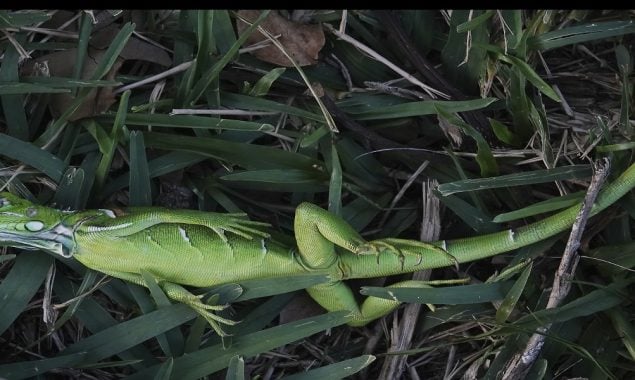
According to the media, Iguanas are falling from trees in the southern portion of Florida due to the extreme cold, alarming residents.
The United States National Weather Service Because of the region’s exceptionally chilly weather, the city of Miami-South Florida issued a public warning on Sunday that immobilised iguanas could fall out of trees.
On Twitter, according to the service, “Iguanas are cold-blooded. They slow down or become immobile when temps drop into the 40s (4-9 Celsius). They may fall from trees, but they are not dead.”
Jan 30: A cold morning…not as cold as our friends to the north dealing with a blizzard…but we have our own lizards to worry about.
AdvertisementDid you really think with the coldest temperatures in over a decade we would not warn you about falling Iguanas? #Iguanas #flwx pic.twitter.com/ornSpetd6a
— NWS Miami (@NWSMiami) January 30, 2022
Read more: Cold Marathon of Siberia: Temperature at minus 63.4 degrees
When iguanas sleep in trees they appear to fall from the sky when their bodies go inactive. When the temperature drops below 40 degrees, the cold-blooded creatures slow down or stop moving, these animals gradually mobilise as the early morning light warms them and the temperature rises. Here are some videos and images depicting the strange event:
It’s raining frozen iguanas in Florida 😳 pic.twitter.com/WIy2O0LdMA
— NowThis (@nowthisnews) January 31, 2022
In Florida, immobilized iguanas are falling from trees due to cold weather conditions https://t.co/wPtXvCsAuV pic.twitter.com/7OiMSqpcko
— Reuters (@Reuters) January 31, 2022
Florida officials warned of "frozen" iguanas falling from trees after temperatures dropped to the 40°s.
AdvertisementIguanas are not native to Florida and were accidentally introduced as stowaways on cargo ships. Officials say cold makes them "lose their functions," but "they are not dead." pic.twitter.com/A273KJsLSB
— AJ+ (@ajplus) January 31, 2022
It could rain iguanas in Florida this weekend!🦎🥶 pic.twitter.com/wKedDYiuGW
— Meteorologist Katie Nickolaou (@weather_katie) January 27, 2022
According to the National Weather Service, West Palm Beach saw its coldest dawn in 12 years, with a temperature of 37 degrees Fahrenheit (about 3 degrees Celsius). The previous record low, achieved in 1978 in Vero Beach, Florida, was 30 degrees Fahrenheit (roughly negative 1 degree Celsius).
The iguana phenomena were revealed to the media by zoologist Stacey Cohen, a reptile expert at the Palm Beach Zoo in Florida. Cohen stated, “Their bodies basically start to shut down where they lose their functions and so they are up in the trees on the branches sleeping and then because it gets so cold, they lose that ability to hang on and then they do fall out of trees a lot.”
Read More News On
Catch all the Trending News, Viral News, Breaking News Event and Latest News Updates on The BOL News
Download The BOL News App to get the Daily News Update & Follow us on Google News.




